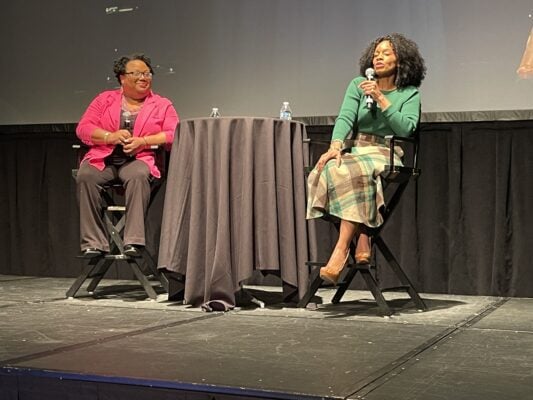As a part of Indiana Comic Con’s weekend of events right in the middle of Women’s History Month, I interviewed two living, breathing, history-making women.
Tony Award-winning actor Anika Noni Rose is the first Black woman to portray a Disney princess — tiara, amusement park ride and all. She took on the role of Princess Tiana in 2009’s “The Princess and the Frog.” Sonequa Matin-Green is the first Black woman to play a captain in the TV series “Star Trek: Discovery.”
Both were the first Black women to step into pivotal roles. Both rose to the occasion while maintaining their dignity in the face of all the backlash they received. Both took seriously the responsibility of being the first Black women to hold these iconic positions.
There can only be one first, and by being first in their respective roles, they have each solidified their places in history. Both Martin-Green and Rose, a.k.a. Princess Tiana, hugged me, confirming they were as real as their undeniable influence on our culture. Pinch me!
Some may argue that it’s just entertainment and these fictional characters are not so significant. Tell that to all the girls and women of different races who dressed as Princess Tiana for the convention. Or try telling that to the racially diverse crowd that erupted in applause as Martin-Green talked about being the first Black woman to helm a ship in the entire history of the Star Trek franchise.

For the generations that have grown up with Princess Tiana, it may be hard to imagine there was a time when a Black American Disney princess was unthinkable. Rose said having a Black woman in this role was a chance for little Black and brown girls to see themselves differently and in turn for other people to see them differently. The princess’ skin tone and facial features were even modeled after Rose.
In “Star Trek: Discovery,” we see Marin-Green take her character, Michael Burnham, from captain to commander to admiral by the end of the series. Fans watched for five seasons as her character stepped into her full power.
Martin-Green also starred in the zombie-focused TV series, “The Walking Dead.” In her final scene (spoiler alert), as she is about to sacrifice her life to save her loved ones, she motivates herself by listening to a song on an MP3 player. Her song of choice was none other than Donny Hathaway’s “Someday We’ll All Be Free.”
Hathaway sings, “Get yourself in gear/Keep your stride/Never mind your fears/Brighter days will soon be here/Take it from me, someday we’ll all be free.”
This song that speaks of freedom was a poignant way to end the character’s run on the show. During this exact moment in time, the song is also a message of hope that we will be free of the arbitrary limitations we put on ourselves and others based on race and gender.

Rose and Martin-Green’s work provides an example of what is possible if we let go of our narrow views.
In the current political climate, diversity initiatives are being rolled back across the country. DEI is blamed for various failures from plane crashes to wildfires and even an attempted assassination. It should be noted that in two of the instances, a woman was in the top role.
Many are questioning who is qualified and who has merit, with detractors often stating that women and women of color are unqualified by default — especially when that woman is in a position of leadership.
Being born into a specific skin color and gender can become a political statement when you dare try and do something that is deemed “not for you.” But as Rose stated during the Comic Con interview, no one can tell you that you don’t belong in any space because no one owns belonging.
I was honored to thank Rose and Martin-Green in person for their contributions to our screens and to helping everyone see what is possible for girls and women who look like us.
While representation has recently become a controversial word, it still matters. Because if people don’t see women and women of color in leadership, they will not know what is achievable and we miss out on the brilliance that others have to offer.
Contact Editor-in-Chief Camike Jones at camikej@indyrecorder.com or 317-762-7850.
Camike Jones is the Editor-in-Chief of the Indianapolis Recorder. Born and raised in Indianapolis, Jones has a lifelong commitment to advocacy and telling stories that represent the community.









